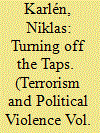| Srl | Item |
| 1 |
ID:
184459


|
|
|
|
|
| Summary/Abstract |
The provision of external state support to non-state armed groups in civil wars is a dynamic process. While we know much about the initiation of external support and its effects, we know less about why state sponsorship changes over time. Based on a within-case analysis of the United States’ support commitment to the armed opposition in Nicaragua in the 1980s, this article demonstrates the utility of focusing on shifts in leaders’ perceptions and domestic attribution processes rather than structural features of the international system or rebel behaviour to understand temporal variation in external support.
|
|
|
|
|
|
|
|
|
|
|
|
|
|
|
|
| 2 |
ID:
191603


|
|
|
|
|
| Summary/Abstract |
External state support to non-state armed groups is commonly seen as a direct relationship between a state sponsor and a rebel group. But powerful states often use third-party states as conduits of military aid. These intermediary states are secondary, subordinate principals that are part of extended chains of “dual delegation.” Because intermediaries are likely to have their own separate agendas, powerful states often face a double principal-agent problem when providing material support to rebel groups. The difficulties and problems associated with controlling the agent are reflected in the relationship between the principal and the intermediary. States need to identify the alignment of interests at an early stage, or risk strategic failure. There are two ideal types of intermediaries—dealers and brokers. Case studies of the United States’ support to the Mujahideen in Afghanistan and to UNITA in Angola (channeled through Pakistan and Zaire, respectively) demonstrate that intermediaries affect the provision of external support. States engaging in counterterrorism need to look beyond sponsors of terrorism and explore the role of all states involved in the process of conflict delegation. That states use intermediaries when providing support to non-state armed groups indicates that holding states accountable for violating the nonintervention principle under international law should be reconsidered.
|
|
|
|
|
|
|
|
|
|
|
|
|
|
|
|
| 3 |
ID:
191527


|
|
|
|
|
| Summary/Abstract |
Policymakers sometimes argue that material assistance to rebels involved in a civil war can create a ‘ripe moment’ that is favorable for negotiations. Ripeness theory provides support for this idea. However, this notion has never been systematically assessed. This article evaluates this claim by using global data on negotiations in all intrastate armed conflicts from 1975 to 2009. Contrary to popular belief, the article demonstrates that external state support to rebel groups does not increase the prospect of negotiations. Instead, the results suggest that external support is likely to reduce the likelihood of negotiations between the warring parties, especially if the state sponsor is a great power. The study contributes to our understanding of civil war processes by demonstrating that military assistance hinders rather than promotes the onset of negotiations and by questioning the utility of ripeness theory as the most suitable framework for understanding this phenomenon.
|
|
|
|
|
|
|
|
|
|
|
|
|
|
|
|
| 4 |
ID:
169909


|
|
|
|
|
| Summary/Abstract |
Why do some states terminate their sponsorship of rebel movements while others are persistent in their provision of support? In the past, most research on external support to insurgents has focused on why states choose to sponsor rebel groups and particularly how this affects conflict duration. However, we know little about the termination of such support. This is surprising given that support has been shown to make armed conflicts more intractable and tremendous efforts are made in condemning and sanctioning such behavior. This study constitutes the first large-N analysis of support termination, employing survival analysis on global data of state support to rebel movements between 1975–2009. Surprisingly, the findings indicate that only some of the factors that explain support provision can offer insights into its termination. In particular, support is more likely to be terminated when no ethnic kinship bonds exist between the rebel movement and the government of the supporting state. Many decisions to withdraw support also seem to coincide with the transition from the Cold War. Threats and sanctions from other states appear largely ineffective. The study contributes to our understanding of the international dimensions of civil war and the role and motives of third parties.
|
|
|
|
|
|
|
|
|
|
|
|
|
|
|
|